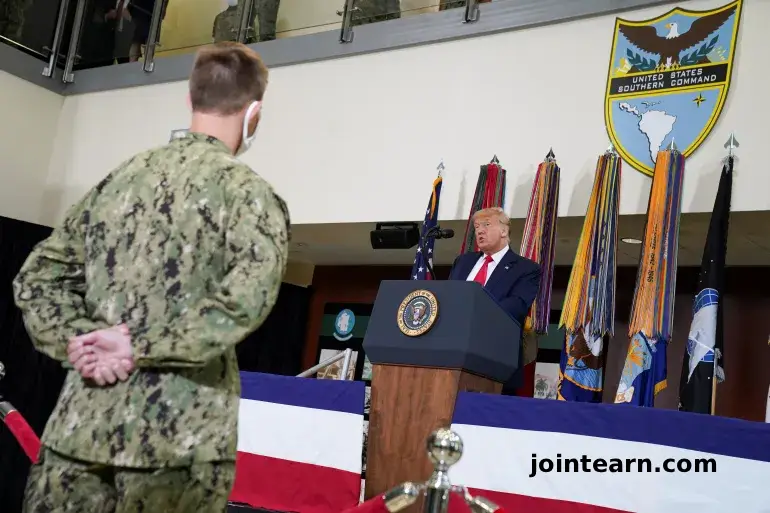
US Launches Operation Southern Spear
Washington, D.C. – The United States has formally announced Operation Southern Spear, a large-scale military initiative aimed at countering what Washington calls “narco-terrorists” in Latin America. U.S. Defense Secretary Pete Hegseth confirmed the operation on X (formerly Twitter), emphasizing the mission’s dual goal: defending the homeland and disrupting drug trafficking networks.
“Today, I’m announcing Operation SOUTHERN SPEAR. Led by Joint Task Force Southern Spear and @SOUTHCOM, this mission defends our Homeland, removes narco-terrorists from our Hemisphere, and secures our Homeland from the drugs that are killing our people,” Hegseth stated.
The operation falls under the jurisdiction of U.S. Southern Command (SOUTHCOM), which oversees military responsibilities across 31 countries in South America, Central America, and the Caribbean.
Escalating Military Deployment
The announcement coincides with a historic U.S. military presence in the region, described as the largest in generations. USS Gerald R. Ford, the United States’ most advanced aircraft carrier, is expected to arrive off the coast of Venezuela, complementing a deployment of thousands of troops, warships, and fighter jets.
SOUTHCOM reported that U.S. Marines conducted artillery exercises aboard the USS Iwo Jima in the Caribbean, part of the operation to disrupt drug trafficking networks and protect U.S. national security.
Recent Attacks on Maritime Targets
The operation follows reports of the 20th U.S. strike on vessels in the Caribbean and Pacific this year. Earlier this week, a suspect drug-smuggling vessel was targeted, reportedly leaving no survivors and killing four people. While the U.S. claims these attacks target drug traffickers, critics note that the government has provided limited evidence or legal justification for the lethal operations, which have killed approximately 80 individuals to date.
U.S. Secretary of State Marco Rubio responded to criticism from G7 allies, asserting that European nations “will not dictate how Washington chooses to defend U.S. national security.”
Venezuela Responds to U.S. Military Presence
The surge in U.S. forces has raised alarms in Venezuela. President Nicolás Maduro accused the U.S. of creating false narratives to justify attacks on regional vessels, claiming Washington has no evidence of hidden biological or chemical weapons in the country.
Venezuela has mobilized nearly 200,000 troops for exercises to strengthen readiness against the perceived imperialist threat posed by U.S. forces. Defense Minister Vladimir Padrino López described the U.S. presence as a “vulgar attack on sovereignty and regional peace.”
Analysts argue that the deployment is symbolic rather than operational. Elizabeth Dickinson, senior analyst at the International Crisis Group, told the AP:
“There’s nothing that an aircraft carrier brings that is useful for combating the drug trade. I think it’s clearly a message geared towards pressuring Caracas.”
Strategic Implications of Operation Southern Spear
While the U.S. officially frames the operation as a counter-narcotics mission, the scale and visibility of the deployment suggest broader geopolitical objectives, particularly influencing Venezuelan political dynamics. The operation demonstrates Washington’s commitment to projecting power in the Western Hemisphere, potentially reshaping regional security dynamics.
Military analysts also note the risks associated with prolonged U.S. presence, including the potential for escalation with local forces, strained diplomatic relations, and increased anti-American sentiment in South America.
Summary
Operation Southern Spear marks the most significant U.S. military build-up in Latin America in decades. While officially targeting narco-terrorism and protecting the homeland from drug-related threats, the deployment—featuring aircraft carriers, fighter jets, and thousands of troops—has sparked tensions with Venezuela and raised questions about the operation’s broader political and strategic objectives.
The coming weeks will be critical in observing how SOUTHCOM operations unfold, the international response, and the potential impact on U.S.-Latin America relations.


Leave a Reply